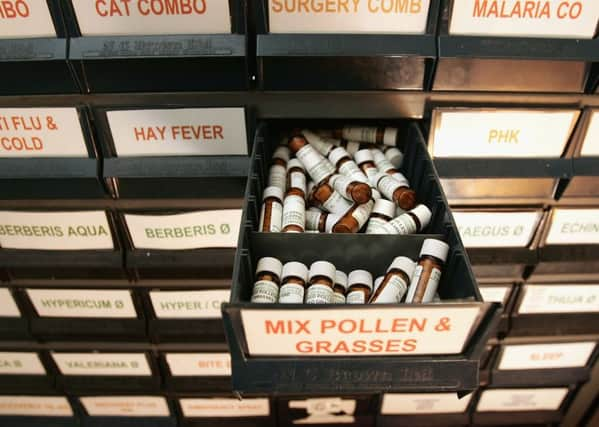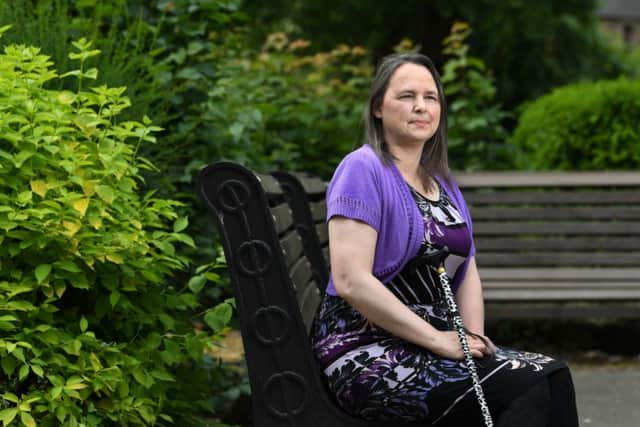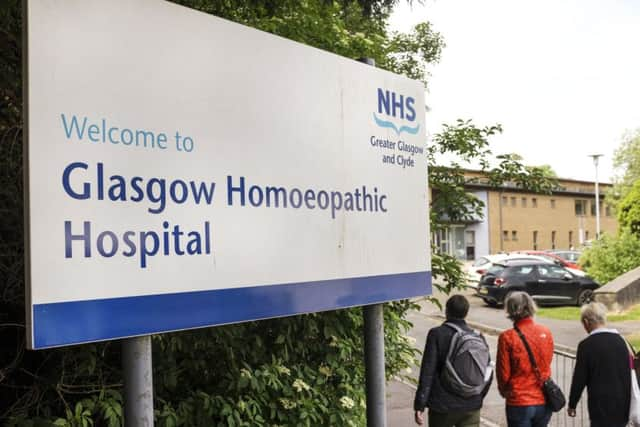Insight: Terminal diagnosis for homeopathy


“I was absolutely furious with my GP,” she admits. “I thought: ‘What is this – are you sending me for sugar pills?’ I was utterly sceptical.”
Such was her pain, however, she went anyway. Once there, she was placed under the care of a former GP, Bob Leckridge. He had become disenchanted with prescribing a litany of “antis” – antibiotics, antidepressants, anti-inflammatories and antihistamines – and wanted to focus on healing the whole person. Ask McGowan now what she thinks of homeopathic medicine and she still isn’t 100 per cent sure it is effective. What she is convinced of, however, is that under the care of Leckridge her condition improved.
Advertisement
Hide AdAdvertisement
Hide Ad“What I think is missed sometimes about what they do at the Centre for Integrative Care [CIC] is that it’s not just about giving people sugar pills. What you are provided with is a level of care you don’t see anywhere else in the NHS.


“For example, the appointments were an hour long; they were holistic; they looked into everything about you. Bob introduced me to meditation, to relaxation. He did give me homeopathic remedies – and I have no idea whether they worked or not – but I know while I was there, I felt better .”
Unfortunately, McGowan’s health deteriorated again in the wake of flu vaccinations; more tests carried out privately to get to the bottom of her complicated neurological and cardiological symptoms revealed she had chronic Lyme Disease (which is, in itself, a contentious diagnosis). Now, Leckridge is retired and, in any case, McGowan is rarely well enough to make it out of the house, but she says she still uses the pain management techniques she learned at the centre every day.
Although it still has its fierce defenders, homeopathy is an increasingly discredited area of medicine; developed in the 1790s by German doctor Samuel Hahnemann, it is based on the principle that “like cures like”; that a substance which causes particular symptoms can also help cure those symptoms.
Key to the treatments is a process of dilution and shaking known as succussion. The bulk of homeopathic remedies consist of substances that have been diluted in water many times until there’s none, or almost none, of the original substance left.


Unsurprisingly, critics dismiss homeopathy as quackery; medical hocus pocus that preys on the desperation of the chronically ill. In 2010, a House of Commons Science and Technology Committee report found homeopathic remedies performed no better than placebos, while England’s Chief Medical Officer, Professor Dame Sally Davies, agreed the principles on which it is based are “scientifically implausible”.
South of the border, all homeopathic hospitals have now closed other than the Royal London Hospital for Integrated Medicine, which has been told to stop prescribing homeopathic medicines. And last week, NHS England won a High Court case which allowed it to stop paying the £92,000 cost for homeopathic medicine prescribed by GPs. The court case came about because its original decision was challenged by the British Homeopathic Association (BHA). The BHA argued there was “plain evidence homeopathic treatment does work in particular cases”.
The High Court made no judgment on the legitimacy or otherwise of homeopathy, merely endorsing NHS England’s consultation process as “fair and balanced”. But its ruling leaves Scotland as almost the last place in the UK where homeopathy is still available on the NHS.
Advertisement
Hide AdAdvertisement
Hide AdAccording to figures compiled by the Good Thinking Society – a nonprofit organisation promoting scientific scepticism – the NHS in Scotland currently spends £1.7 million a year on the CIC, which is based at Gartnavel in the West End of Glasgow; there are no figures available for the amount of money being spent on homeopathy through GP prescribing but – based on the English example – it is likely to be in the tens of thousands.
When Greater Glasgow and Clyde Health Board announced plans to close the hospital’s in-patient facilities last year, the move was fiercely opposed by former patients.
But the English court decision means the CIC is once again likely to find itself in the firing line, especially as the Good Thinking Society, which had focused on England and Wales, is now likely to turn its attention north.
BMA Scotland is also opposed to NHS spending on homeopathy. “We believe there should be no further commissioning of, nor funding for, homeopathic remedies or homeopathic hospitals,” says Dr Adam Collins, chair of the BMA Scotland Junior Doctors Committee. “No UK training post should include a placement in homeopathy, and pharmacists and chemists should remove homeopathic remedies from shelves indicating they are ‘medicines’ of any description, and place them on shelves clearly labelled ‘placebos’.”
Michael Marshall, project director for the Good Thinking Society, says the organisation embarked on its campaign because homeopathy was 100 per cent discredited.
“I can understand why a patient would be passionately in favour of homeopathy, especially if they’ve been told by a practitioner: ‘This is the thing for you.’ If you are in a very vulnerable position, and if you have a condition where you have had lots of different treatments and none of them seem to work, I can see why this last resort might feel like the thing and you don’t want that to be taken away.
“The patients themselves are not the problem, but they are one of the reasons why homeopathy persists, as are the practitioners around the country who will seek the imprimatur of the NHS on homeopathy and use that as sign of the respectability and legitimacy of their treatment.”
The CIC began life as the Glasgow Homeopathic Hospital on Great Western Road. The design for the current building was put out for competition as part of the city’s Year of Architecture 1999 and its £2.78m construction was funded by legacies and public donations (though, on opening, it became part of the NHS).
Advertisement
Hide AdAdvertisement
Hide AdJust five years later, however, NHS Greater Glasgow was already talking about closing 15 overnight beds to save £300,000 and – though the board backed down at this stage – the hospital has faced a succession of cuts ever since.
Around 2010 the hospital started closing at weekends and the on-site pharmacy was removed, while the number of nurses is said to have dropped from 22 to two full-time nurses and one part-time nurse in the same period.
Over the past few years, the number of health boards referring to the hospital has also declined; according to the Good Thinking Society, in 2015/16 only five others – Ayrshire and Arran, Grampian, Tayside, Western Isles and Shetland – were still using the service, although NHS Lothian is believed to still refer a handful of patients.
The in-patients facility, which latterly, consisted of seven beds and accounted for just 5 per cent of attendances, was closed last year, but in 2015/16, the number of attendances stood at 5,737.
Other treatments advertised on its website include mindfulness, music therapy, anthroposophic medicine, acupuncture and mistletoe or iscador treatment, which is particularly controversial.
According to Marshall not only is mistletoe therapy unscientific, it is potentially dangerous. “When it’s given to cancer patients on the NHS, the justification used is that it helps with side-effects of chemotherapy, such as nausea, but there’s no evidence that it works,” he says.
“What’s worse, though, is that iscador, was designed as a cancer treatment. Rudolf Steiner observed that mistletoe grows on trees and starts to take over the organism, and decided that is much the same as how cancer cells grow in the body. Therefore he reasoned mistletoe must cure cancer. I am aware of NHS GPs who actually believe this stops the growth of cells, even though there is absolutely no evidence that it does”
There is no suggestion, of course, that doctors at the CIC are using mistletoe therapy as a cure and the website specifically states it is not an alternative to conventional cancer treatment.
Advertisement
Hide AdAdvertisement
Hide AdIn the past, some politicians, including Coatbridge and Chryston MSP Elaine Smith, have defended the CIC against cuts. However, while writing this piece, I did detect a general embarrassment around the homeopathic elements of the service (which may have prompted the name change around 2014). Greater Glasgow and Clyde Health Board declined to put someone up to talk about it, but later issued a statement insisting that, since 2011, no homeopathic medicines have been prescribed or dispensed on site. In other words, the centre’s doctors will consult and advise on homeopathy, but patients will have to ask their GPs for a prescription or pay for the treatments themselves.
As for the Scottish Government, it has effectively washed its hands of the problem by delegating responsibility for the decision on funding to the individual health boards.
The debate over the use of homeopathy is complicated by the fact that – though it has plenty of critics – a number of qualified health professionals continue to have faith in its efficacy. Leckridge now lives in France, but, after spending 20 years at the hospital, he still believes it performs an important role.
“The vast majority of patients asked to be referred to the hospital because their GPs and specialists had exhausted the evidence-based options,” he says. “After all, there are no evidence-based options that work for every single patient. What options are available on the NHS for patients who have exhausted the evidence-based options?”
Leckridge believes the results he witnessed suggest there is more to homeopathy than just a placebo reaction. But he says – even if the treatments were merely placebos – that would not necessarily render them pointless; after all placebos do produce a marked improvement in some people’s conditions. One theory suggests if a patient expects a pill to do something, their body’s chemistry can produce a reaction similar to that of a medicine.
“The whole placebo debate seems pretty superficial and naive to me,” says Leckridge. “Nobody has managed to explain what the placebo effect is, how it works, when it works. So when people say it is ‘just a placebo’ what do they mean? As I said, placebo and doing nothing are not the same and placebo outcomes can be extremely good ones: restoration of normal sleep, elimination of pain, fatigue or dizziness.
“Finally, it’s impossible in any particular consultation to know what part of the patient’s improvement is due to specific effects of a therapeutic agent and which is due to placebo. Surely the placebo response – which we always understood as the ‘self-healing response’ – is an inextricable component of improvement in every positive therapeutic outcome?”
As Marshall points out, ending homeopathy funding is politically tricky because so many patients with chronic long-term conditions – especially those who have been treated like hypochondriacs – view alternative therapies as a lifeline.
Advertisement
Hide AdAdvertisement
Hide AdIn Switzerland, popular support for alternative medicines runs so high that in 2016 the government ruled homeopathy and four other complementary treatments should be covered by basic compulsory insurance.
Perhaps some of this belief in alternative therapies is a backlash to the over-medicalisation of illness. Catherine Hughes, 49, a qualified healthcare professional, says she owes her life to treatments, including homeopathy, that she received at the centre. She led the campaign against the closure of the in-patient beds and has raised a petition complaining about the health board’s alleged failure to promote the service, which she says patients only find out about through “word of mouth”.
Hughes has been ill with multiple long-term conditions, including an auto-immune condition, since 1988. She says the side-effects she suffered as a result of all the conventional drugs she received were so severe she could have died.
“I depend on the service I get at the CIC and haven’t really had a relapse for ten years,” she says. “I wouldn’t go back to a conventional hospital now because when I go in they try to bully me to take conventional medicine and I end up really ill.”
Over her time at the CIC, Hughes has been treated with acupuncture, electric stimulation therapy and homeopathy. “If you have multiple conditions, every specialist you see wants to put you on different medications so your symptoms could be caused by the interaction of all the things you are on.
“The Chief Medical Officer for Scotland, Catherine Calderwood, has a report on holistic medicine which says it should not all be about prescribing pills – well that’s what the CIC does. Some people come out of there on less medication which is better for them and better for the NHS.”
Still, lobby groups such as the Humanist Society Scotland are concerned people like Hughes are being misled. “Homeopathy has gone through extensive testing and never been shown to have any greater impact than a placebo, so the question is: ‘Is this the best use of NHS money?’” asks campaigns director Fraser Sutherland.
“It is worrying that Scotland is now the only part of the UK funding it. It is also worrying that it might be giving people false hope; that it might be leading them to believe these treatments are doing something where all the evidence says they are not doing anything at all.
“By fobbing people off, is homeopathy perhaps masking the original problem and leading to greater healthcare problems in the future?”